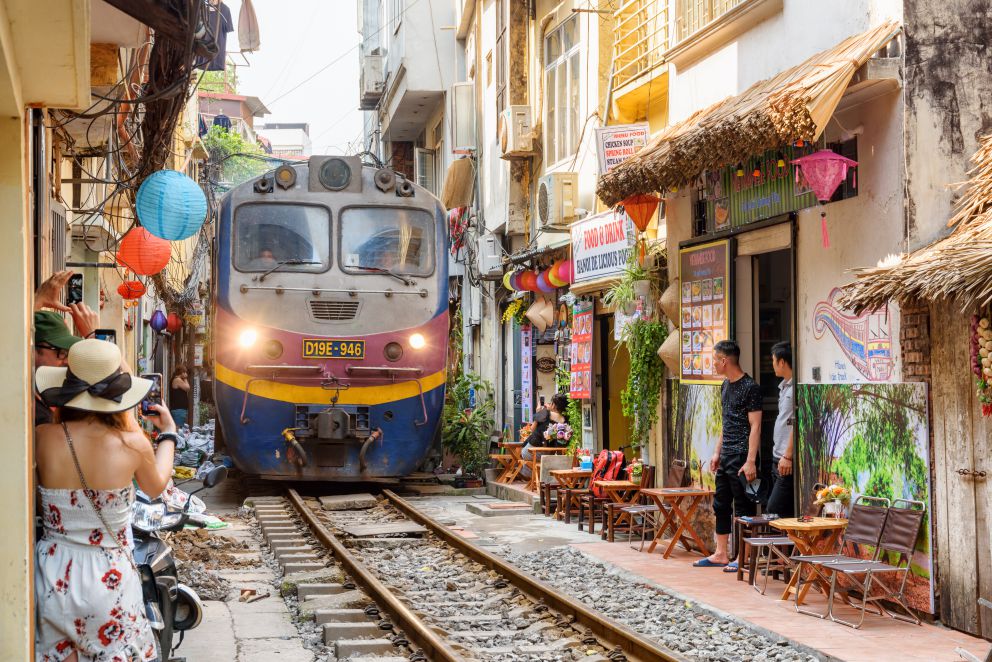Planning a trip to Vietnam can be daunting due to the ever-changing entry requirements and the array of visa options. Many people find it overwhelming to navigate through the complexities of the process. If you’re feeling this way, you’re not alone. The entry requirements for Vietnam are often confusing, and it’s essential to stay updated on the latest regulations. If you’re considering a trip to Vietnam and feeling overwhelmed by the entry requirements, you’re not alone. Navigating the Vietnam entry requirements can be confusing due to constantly changing regulations and various visa options.
Table of Contents
Visa Requirements for Entering Vietnam

To enter Vietnam, the initial step is to establish whether a visa is required. Visa prerequisites for Vietnam hinge on your nationality and the length of your intended stay. Approximately 80 countries, such as the US, Canada, Australia, and many European nations, permit visa-free entry for visits lasting up to 15 days. However, if your stay exceeds 15 days or if you belong to a non-exempt country, obtaining a visa prior to your travel is necessary.
Vietnam Entry Requirements for Malaysian Citizens
If you’re from Malaysia and planning a trip to Vietnam, here’s the deal: You can enter Vietnam without a visa for up to 30 days. But if you plan on staying longer, you’ll need to sort out a visa before you go. Also, good news – Malaysia is one of the countries that can get an e-visa or a visa on arrival when visiting Vietnam.
Vietnam Entry Requirements for UK Citizens
British nationals are allowed to visit Vietnam for up to 15 days without a visa. If they intend to stay longer, they must obtain a visa in advance. Another option is to apply for an e-visa or get a visa upon arrival in Vietnam.
Vietnam Entry Requirements for US Citizens
American nationals are allowed to visit Vietnam for up to 15 days without a visa. If they intend to stay longer, they must obtain a visa in advance. Moreover, US citizens can choose to either apply for an e-visa or get a visa upon arrival when traveling to Vietnam.
Vietnam Entry Requirements for Canadian Citizens
Canadian citizens can travel to Vietnam without a visa for up to 15 days, but if they intend to stay longer, they need to obtain a visa in advance. Moreover, Canada is one of the countries that qualify for an e-visa or visa on arrival when visiting Vietnam.
Vietnam Entry Requirements for Australian Citizens
Australian citizens are allowed to travel to Vietnam without a visa for a period of up to 15 days. However, if they intend to stay longer, they must obtain a visa in advance. Moreover, Australians have the option to apply for an e-visa or obtain a visa on arrival when traveling to Vietnam.
Vietnam Entry Requirements for New Zealand Citizens
Citizens of New Zealand have the privilege of traveling to Vietnam for a period of up to 15 days without needing a visa. However, if they intend to stay longer than this duration, it’s essential for them to obtain a visa in advance. Moreover, New Zealand citizens have the flexibility to choose between applying for an e-visa or getting a visa upon arrival when they visit Vietnam.
Vietnam Entry Requirements for Indian Citizens
Indian citizens must obtain a visa before traveling to Vietnam. They are not eligible for visa-free entry or e-visas. The visa application process for Indian nationals may take longer than for other nationalities, so it’s recommended to apply well in advance of the planned travel date.
Vietnam Entry Requirements for EU Citizens
Most European citizens (excluding Russians) can travel to Vietnam without a visa for up to 15 days. However, if they plan to stay longer, they need to acquire a visa beforehand. Additionally, many EU citizens are eligible for e-visas or visas on arrival when visiting Vietnam.
Vietnam Entry Requirements for Irish Passport Holders
Irish citizens can travel to Vietnam without a visa for visits lasting up to 15 days. However, if they plan to stay longer, they will need to acquire a visa beforehand. Alternatively, Ireland is among the countries eligible for an e-visa or a visa on arrival when visiting Vietnam.
….
Types of Visas Available for Vietnam

If you need to obtain a visa for your trip to Vietnam, there are several options available depending on your purpose of visit and duration of stay.
- E-visa: This is a convenient option for citizens of eligible countries planning short tourist trips (maximum 30 days). The application can be done online and the visa is issued electronically. However, not all nationalities are eligible for an e-visa.
- Visa on arrival (VOA): This option allows you to apply for a visa upon arrival at major airports in Vietnam. You’ll need to pre-arrange a visa approval letter before traveling. The process is simple and straightforward, but it’s important to note that this type of visa is only valid for air travel.
- Embassy visa: For longer stays, business trips, or other specific purposes, you can apply for a visa at the Vietnamese embassy or consulate in your home country. This visa must be obtained before your trip and may require additional documentation.
It’s crucial to understand that the visa you opt for will be contingent upon your specific situation and the intent of your trip. It’s advisable to conduct thorough research and evaluate the various alternatives in order to ascertain the most suitable option for your needs.
Applying for a Vietnam Visa: Online vs. On Arrival

Both online and on-arrival visa applications have their advantages and disadvantages. Let’s take a closer look at each option to help you decide which one is right for you.
Online Visa Application
The process to apply for an e-visa is straightforward and can be completed from your residence. You only require a valid passport, a digital photo, and a credit/debit card for payment. Normally, the e-visa processing time takes around 3 working days, and the fee is $25 USD.
Pros:
- Convenient and time-saving.
- No need to visit an embassy or consulate.
- Can be used for both air and land travel.
Cons:
- Not all nationalities are eligible.
- Limited to a maximum stay of 30 days.
- Cannot be extended or changed once issued.
On-Arrival Visa
To obtain a visa on arrival, you’ll need to pre-arrange a visa approval letter through a travel agency or through the official Vietnam Immigration Department website. You’ll then present this letter at the visa on arrival counter at the airport along with your passport, photo, and visa fee payment (in cash). The processing time for a visa on arrival is typically 2 working days and the cost is $25 USD (for single entry) or $50 USD (for multiple entries).
Pros:
- Can be obtained without visiting an embassy or consulate.
- Suitable for those who have last-minute travel plans.
- Can be used for both air and land travel.
Cons:
- Only valid for air travel.
- Long wait times at the airport.
- Risk of rejection if the supporting documents are not in order.
The decision between an e-visa and visa on arrival ultimately depends on your personal preferences and needs. If you have more time and prefer to avoid any potential hassles at the airport, an e-visa may be the better option. However, if you have a last-minute trip or will only be traveling by air, a visa on arrival may be a suitable choice.
Required Documents for Vietnam Visa Application

The documents required for a Vietnam visa application vary based on the visa type and your nationality. Here are some general requirements.
- Valid passport: Your passport must have at least 6 months of validity remaining and blank pages for the visa sticker.
- Digital photo: A recent color photo (taken within the last 6 months) with a white background is required for both e-visa and visa on arrival applications. Make sure your face is clearly visible and there are no obstructions such as hats or sunglasses.
- Supporting documents: Depending on your purpose of visit, additional supporting documents may be required. For example, if you’re applying for a business visa, you may need to provide a letter from your company or an invitation letter from a Vietnamese business partner.
It’s important to check the specific requirements for your nationality and type of visa before submitting your application to avoid any delays or rejections.
Visa Fees and Processing Time
The cost and processing time for a Vietnam visa can vary depending on your chosen type of visa and processing method. Here’s a general overview:
- E-visa: The cost is $25 USD and the processing time is typically 3 working days.
- Visa on arrival: The cost is $25 USD (single entry) or $50 USD (multiple entries) and the processing time is typically 2 working days. Additional fees may apply if you use a travel agency for your visa approval letter.
- Embassy visa: The cost and processing time may vary depending on your nationality and the embassy/consulate you apply at. It’s best to contact the embassy directly for this information.
Passport Validity Requirements for Entering Vietnam
To enter Vietnam, your passport must meet specific validity requirements. These requirements are in place to ensure smooth entry and exit for all visitors. Here’s a breakdown of the key points:
Passport Validity:
- Your passport must be valid for at least six months beyond your planned stay in Vietnam. This means that if you plan to stay in Vietnam for a month, your passport must be valid for at least seven months from the date you enter the country.
- Some sources state that the validity period should be 6 months beyond the date you plan to leave Vietnam. This is a slightly stricter interpretation, but it’s always best to err on the side of caution and ensure your passport has at least seven months of validity remaining.
Blank Visa Pages:
- You must have at least one blank visa page in your passport. This page is not including the endorsement page.
- The blank visa page is required for the entry stamp and any additional visas you may need during your stay.
Additional Information:
- These requirements apply to all visitors to Vietnam, regardless of nationality.
- If your passport does not meet these requirements, you will be denied entry to Vietnam.
- It is always advisable to check with the Vietnamese embassy or consulate in your home country for the latest information on passport validity requirements.
Changes as of August 15, 2023:
- Vietnam now grants e-visas to citizens of all countries and territories. These e-visas are valid for 90 days and allow for multiple entries.
- Citizens of 13 countries now enjoy visa exemption for stays up to 45 days, regardless of passport type or entry purpose. These countries include:
- Germany
- France
- Italy
- Spain
- the UK
- Russia
- Japan
- Republic of Korea
- Denmark
- Sweden
- Norway
- Finland
- Belarus
Remember: These are just general guidelines. Always consult with the nearest Vietnamese embassy or consulate for the most up-to-date information about passport validity requirements and visa regulations.
Customs Regulations for Entering Vietnam
Understanding customs regulations before entering Vietnam is crucial to ensure a smooth and hassle-free entry. Here’s an explanation of key points:
Prohibited and Restricted Imports:
- Prohibited: Weapons, ammunition, explosives (excluding industrial), military equipment, fireworks (excluding signal fires), sky lanterns, devices affecting vehicle speedometers, used consumer goods, banned publications, postage stamps, unlicensed radio equipment, and others.
- Restricted: Certain foods, animals, plants, medicines, chemicals, and cultural artifacts require permits.
Import Requirements and Documentation:
- Customs Declaration: Mandatory for all imported goods.
- Commercial Invoices: Provide details about the goods, including quantity, value, and country of origin.
- Other Documents: Depending on the goods, permits, contracts, certificates, and licenses might be required.
- Quarantine and Food Safety: Imports subject to inspection by relevant agencies.
- Import Licensing: Certain goods require import licenses from the Ministry of Industry and Trade (MOIT).
Duty and Taxes:
- Duty: Applies to most imported goods based on their value and category.
- Value Added Tax (VAT): Applies to imported goods and services at a standard rate of 10%.
- Exemptions: Duty and VAT exemptions exist for specific goods and travelers.
Customs Clearance:
- Automatic Import Licensing System: Facilitates online license application for a wide range of goods.
- Declaration and Assessment: Importers can self-declare and assess duty for certain goods.
- Specialized Inspection: Certain goods, like pharmaceuticals and electronics, require additional inspections.
- Currency Declaration: Travelers must declare cash exceeding $5,000 USD or equivalent in other currencies.
Additional Points:
- Penalties: Violations of customs regulations can result in fines, confiscation of goods, and even imprisonment.
- Declare all items: Declare all items carried, including personal belongings, gifts, and souvenirs.
- Seek assistance: Customs officials are available to help with inquiries and procedures.
Extension of Stay Options for Visitors in Vietnam
If you’re thinking about extending your stay in Vietnam, there are various options to consider. The possibility of extension depends on the kind of visa you possess and the particular purpose of your visit.
- E-visa: The e-visa is only valid for single entry and cannot be extended. You’ll need to leave Vietnam and apply for a new e-visa if you wish to re-enter.
- Visa on arrival: This type of visa can be extended at the Vietnam Immigration Department. The process typically takes 5-7 working days and costs vary depending on the length of extension.
- Embassy visa: If you have a visa obtained from an embassy, you can apply for an extension at the Immigration Department or the agency who sponsored your visa. The cost and processing time may vary depending on the embassy/agency.
Extending your stay in Vietnam beyond the visa expiration date can lead to penalties and complications during your departure. It’s advisable to seek guidance from either the Immigration Department or a travel agency to obtain more details about prolonging your stay.
Frequently Asked Questions about Vietnam Entry Requirements
Do I need a visa to enter Vietnam?
The visa requirements vary based on your nationality. If you are a citizen of one of 22 specific countries, you do not need a visa for stays ranging from 15 to 30 days. The complete list of countries whose citizens are exempt from visas and the corresponding durations can be found on the Vietnam Immigration website.
If your country isn’t on the visa-exempt list for Vietnam, you’ll have to get a visa before entering. There are a few ways to do this:
1. You can obtain a visa on arrival (VOA) at major airports in Vietnam.
2. Another option is to apply for an e-visa online before your trip.
3. Alternatively, you can visit a Vietnamese embassy or consulate in your home country to get the necessary visa for your travel to Vietnam.
What documents do I need to apply for a visa?
The required documents for a visa application may vary depending on your nationality and the type of visa you are applying for. However, some standard documents include:
- A valid passport with at least six months of validity remaining after your intended departure date from Vietnam.
- Two passport-sized photographs.
- A completed visa application form.
- Proof of onward travel (e.g., flight booking).
- Proof of sufficient funds (e.g., bank statement).
- Visa fee payment confirmation.
How long does it take to process a visa application?
The time it takes to process a visa application can differ based on the visa type and the workload of the Vietnamese embassy or consulate. For Visa on Arrival (VOA) applications, it usually takes 1-2 days, while e-visa applications can be processed within 3 days. However, if you submit your application at a Vietnamese embassy or consulate, it may take longer, potentially up to 10 working days.
What are the COVID-19 entry requirements for Vietnam?
As of today, October 27, 2023, Vietnam has lifted most COVID-19 entry restrictions. Travelers are no longer required to show proof of vaccination or a negative COVID-19 test result upon arrival. However, it is recommended to be fully vaccinated against COVID-19 and to follow basic health and hygiene measures.
Conclusion
Comprehending the entry requirements may appear daunting, but with this comprehensive guide, you’ll have all the essential details for a smooth and stress-free arrival in Vietnam. It’s important to carefully examine the specific conditions depending on your nationality and visa type before starting the application process. Also, make sure to allow ample time for processing. With thorough planning and preparation, you’ll soon be ready to enjoy everything Vietnam has to offer. Wishing you a safe and enjoyable journey!
Leave a Reply